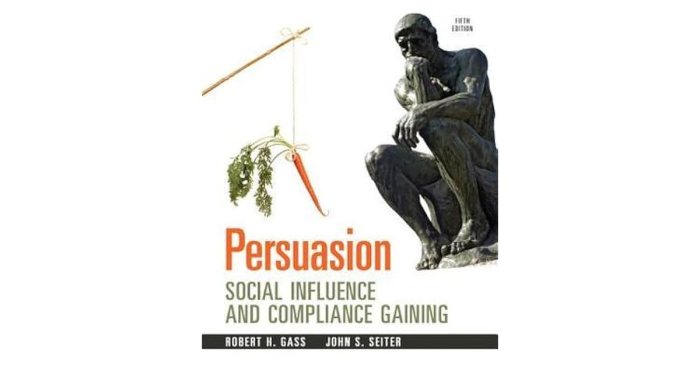Persuasion social influence and compliance gaining 6th edition pdf – In the realm of human interaction, persuasion, social influence, and compliance gaining hold immense sway. Delve into the “Persuasion, Social Influence, and Compliance Gaining: A Comprehensive Guide (6th Edition)” and uncover the intricacies of these captivating concepts, exploring their multifaceted nature and profound implications in everyday life.
This meticulously crafted guide serves as an indispensable resource, providing a comprehensive overview of the theories, techniques, and ethical considerations surrounding persuasion and social influence. Embark on an enlightening journey as we delve into the dynamics of compliance gaining, unravel the power of persuasion in various contexts, and empower you with strategies to navigate the complexities of human influence.
Persuasion and Social Influence: Key Concepts

Persuasion is the process of influencing someone’s beliefs, attitudes, or behaviors through communication. Social influence is the process of changing someone’s thoughts, feelings, or behaviors through the influence of others.
There are three main types of persuasion: rational, emotional, and moral. Rational persuasion appeals to logic and reason, emotional persuasion appeals to feelings and emotions, and moral persuasion appeals to values and ethics.
Social influence can play a significant role in persuasion. People are more likely to be persuaded by others who they perceive as similar to themselves, who they admire, or who they have a close relationship with.
Compliance Gaining

Compliance gaining is the process of getting someone to do something that they do not want to do. There are many different techniques of compliance gaining, including:
- Legitimate authority: Using one’s position of authority to get someone to comply.
- Reward: Offering someone something they want in exchange for compliance.
- Coercion: Threatening someone with negative consequences if they do not comply.
- Ingratiation: Getting someone to like you before asking them to comply.
The effectiveness of a compliance gaining technique depends on a number of factors, including the power of the person making the request, the relationship between the person making the request and the person being asked, and the nature of the request.
Persuasion and Social Influence in Practice

Persuasion and social influence are used in a variety of everyday situations, including:
- Advertising: Companies use persuasion to convince people to buy their products or services.
- Politics: Politicians use persuasion to convince people to vote for them.
- Relationships: People use persuasion to influence their partners, friends, and family members.
It is important to be aware of the ethical implications of persuasion and social influence. Persuasion can be used for good or for evil, and it is important to use it responsibly.
Case Studies in Persuasion and Social Influence: Persuasion Social Influence And Compliance Gaining 6th Edition Pdf
There are many case studies of successful persuasion campaigns. One example is the “I Can’t Believe It’s Not Butter!” campaign, which used a variety of persuasion techniques to convince people to buy their margarine instead of butter.
Another example is the “Just Do It” campaign by Nike, which used emotional persuasion to motivate people to get active.
These case studies can provide valuable insights into the effective use of persuasion and social influence.
FAQ Overview
What is the central theme of this guide?
The guide focuses on the interconnected concepts of persuasion, social influence, and compliance gaining, exploring their nature, techniques, and ethical implications.
How can I apply the principles of persuasion in my daily life?
By understanding the principles of persuasion, you can effectively communicate your ideas, influence others’ opinions, and build stronger relationships.
What are the ethical considerations associated with persuasion?
It is crucial to use persuasion ethically, ensuring that it is not manipulative or coercive and respects the autonomy of others.